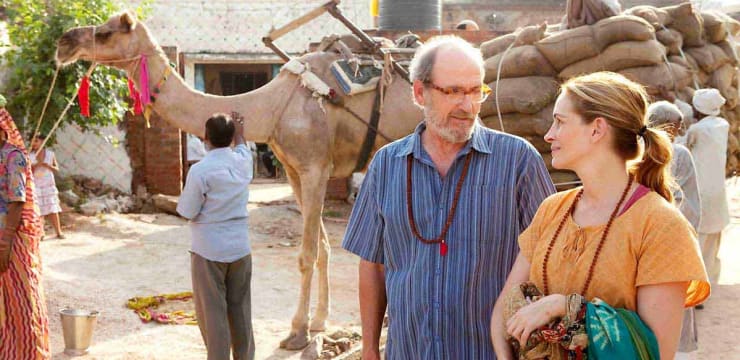Eat Pray Love is based on a memoir by American journalist and author, Elizabeth Gilbert. The book was an international success, having sold 12 million copies and translated into over 30 languages. The book, like the movie, is often criticized for its vanity and fetishization of eastern culture. However, the book is also said to be better than the movie and regarded as a feel-good beach book. The film and the book it is based on explores the globe-trotting adventures of Elizabeth Gilbert. She has everything yet not quite, and to satiate this deficiency, she embarks on a journey to find her true self. Also Read: 5 Julia Roberts Movies Go Watch In 2021
A Story Of A Successful Yet Lost Woman
The film follows Elizabeth Gilbert, played by Julia Roberts, a modern woman who has everything. Despite having a husband, a career, and a house, she feels something missing in her life. Fresh out of a divorce, lost, and in need of meaning, she decides to venture out of her comfort zone. And thus, she sets out on a journey, across continents, in search of meaning and self-discovery. During the three parts of her journey, the film presents a collage of beautiful and scenic beauty of different countries. In her travels, she spends 4 months in Italy, nourishing herself with food. The next four months see her spending time in an Indian ashram, meditating, and finding her spiritual self. And finally, the next four have her in Bali, unexpectedly falling in love, finding inner peace, and balance. Eat Pray Love is, at times, a flawed and shallow experience. We follow a successful travel writer, Gilbert, who has nearly everything one could wish for, and beyond. She seems to have an awful load of luck when it comes to men who look like the poster boys of a fashion magazine. But a successful career, wealth, and a husband do not suffice. She divorces her husband, played by Crudup, because she has grown weary of it – weary of such a troubled life! Her inner-struggles are reminiscent of the meme, “suffering from success.” This lack, borne out of suffering from a perfect life, thrusts Gilbert to replenish it. And off she goes, to the scenic, serene, and predictably commonplaces, in search for her inner-self and peace. Her travels are funded by the money she’s attributed in advance to write the book. Also Read:
Honest Thief Review: A Decent But Forgettable Flick Movie Review: Judas And The Black Messiah
The Three Checkpoints Of Self-Discovery
She starts from Italy, where she finds first of many meanings of life – eating up entire menus. I don’t know what meaning can possibly be derived from gorging on pasta in Italy, but we persevere. However, the Italian part does have some heart-warming instances of familial bonding. There, she meets a young and beautiful woman, Sofi ( Tuva Novotny). She also meets a group of locals who teach her the meaning of community and belonging. Although, the story does play on stereotypes of these big, joint Italian families and the Italian food. As if there’s nothing Italy has to offer besides that. In Italy, she also meets a young man, played by James Franco, who falls for her, like many others. He serves as a distraction for Gilbert, who soon realizes that she’s on a quest for meaning. And so she heads off to India. In India, she is to find meaning in meditation and spirituality. There, she meets a bearded Texan, Richard (Richard Jenkins). He serves as an enlightenment mentor for Gilbert, giving ever-so-banal philosophy. He guides Gilbert in her crash course of meditation and discipline. This part of the film is also the slowest and boring. At least the food of Italy and scenes of Bali provide for some eye-feast. The Indian checkpoint of her self-discovery journey is just a trite and tired trope of treating eastern cultures as a stereotypical template. The philosophy and the meditative discipline lessons Gilbert learns while in India are the most elementary and shallow examples. The “eastern enlightenment” is very fetishized and romanticized. Gilbert gains another meaning concerning spirituality and discipline without applying any sort of significant rigor that it will require.
The Film’s Appeal
After the enlightenment crash course in India, Gilbert heads off to the third and final checkpoint of self-discovery. In Bali, she first revisits a shaman (Hadi Subiyanto), who had given her the tremendous insights of finding her true self and other such divinations. The Bali part is where Gilbert culminates all the lessons she has learned on her journey so far. She meets Felipe (Javier Bardem), who is, yet again, a handsome and charming man. He is a divorcee himself and seems to be the single-go-lucky type. That is until he meets Gilbert. And like all other men in the film, he falls for her. Gilbert is reluctant to fall in love since it may not be congruent to the lessons she’s learned so far. But alas! The shaman gives her a final lesson, and she learns that ditching Javier Bardem is hardly enlightened. It is difficult for many to see the appeal of the story and the characters here. And yet, both the movie and the book have done ridiculously well in terms of popularity and commercial success. I think the reason for that lies in the surface-level consumption of media like it. It is essentially a glorious travelogue that treats these foreign destinations as exotic places with a facade of the spiritual journey. That has a lot of appeal among the target audience of Gilbert’s book. The film also has a couple of redeeming qualities. Although it lacks in properly fleshing out some of the characters as they are in the book, it’s beautiful nonetheless. The cinematography is gorgeous and helps make the film a wonderous escape, which might have been the right way to tell the story, instead of making it about the “self-discovery”.
The Cast Redeems The film.
The film is also elevated by strong performances by Julia Roberts, Javier Bardem, and others. The supporting cast isn’t given much to do, but Viola Davis and Richard Jenkins make the most of their screentime. Julia brings believability to her role as Gilbert. To be honest, it’s the cinematography and the performances that make the film passable to me. Other than that, the excessive carpe diem rigor, cloaked with mystical and spiritual discovery, is not easy to ingest. Billy Crudup as the divorced husband, is a strong supporting addition. Richard Jenkins also lends much warmth as the spiritual mentor at the Indian ashram. It’s Julia Roberts, however, who carries the film and is the reason for so much of its appeal. The soundtrack is a wonderful rendition by Dario Marianelli that perfectly serves the movie’s themes. The production design and the camerawork also complement the film’s aesthetic. Director of photography, Robert Richardson, does a great job at canvassing exquisite scenery and locales. These are the prominent factors contributing to the film’s success. That, and the film’s ability to entertain the target audience with its feel-good, albeit inane text. The film would not have worked nearly as effectively as it did, had the film consisted of a different cast. Other than that, the cliché-ridden, shallow, and faux-philosophical story is a difficult ask for its lengthy runtime. If that’s your cup of tea, you can stream Eat Pray Love on Netflix. Read:
I Care A Lot Review: Psychological Thriller About Guardianship Fraud The Father Review : A Painful Story About Dementia



